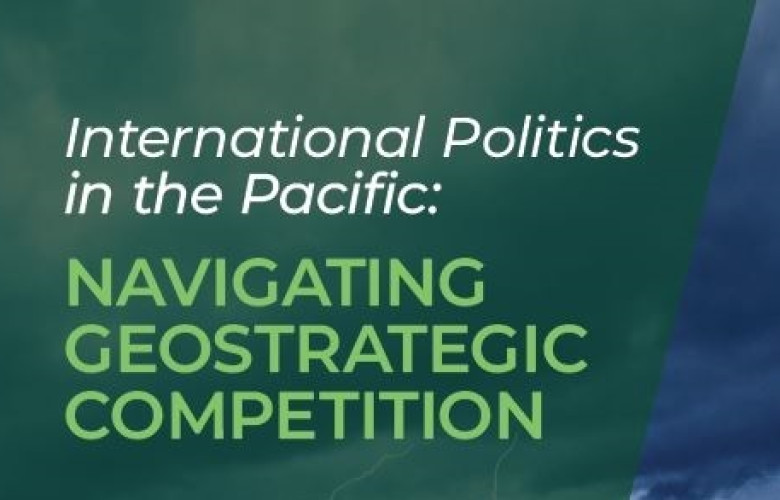What is New Zealand’s place in a turbulent Pacific region?
Guy Fiti Sinclair
2024-10-22
PACIFIC
GEOPOLITICS

Given this mismatch between activity and outcomes, New Zealand can have considerable influence in the region - if it can learn the lessons of the past.
This was the view of 15 Pacific-region experts at a recent symposium organised by the New Zealand Institute of International Affairs.
Who is doing what in the Pacific?
Pacific Islands Forum (PIF) leaders have recognised for many years they are operating within an “increasingly complex regional security environment”.
Individual Pacific countries have entered into over 60 security agreements with external actors. More than half of these are with so-called ‘traditional’ partners like Australia, New Zealand and the US. But interest in regional security arrangements from China, Japan, South Korea, the United Kingdom, the European Union and others demonstrates the rapid increase in engagement from outside the region.
Other international organisations have become increasingly active, including the World Bank, the Asian Development Bank, and a range of climate-focused entities. Philanthropic entities such as the Bezos Earth Fund and the Waitt Foundation are significant players in areas like conservation.
Multinational corporations also play potentially crucial roles in regional economic development plans, such as Google’s multi-billion dollar “Pacific Connect Initiative”, which includes plans to lay subsea cables between several Pacific countries.
This interaction with Pacific countries is affecting their political relationships, making the region more complex and less stable.
What do Pacific countries want?
At a collective level, Pacific countries are clear about what kinds of engagement they want. The PIF’s 2050 Strategy for the Blue Pacific Continent sets out the vision for the next quarter-century, centred on “a resilient Pacific Region of peace, harmony, security, social inclusion and prosperity, that ensures all Pacific peoples can lead free, healthy and productive lives.”
As PIF Secretary-General, Baron Waqa, put it: “Geopolitical manoeuvering means nothing to Pacific peoples who have cyclones coming over the horizon [and] are focused on building resilience, peace and prosperity for our families, communities, nations and our region.”
What can New Zealand do?
New Zealand’s greatest strengths lie in the close associations and trust it has already established with Pacific countries - for example contributing to resolving conflicts in Bougainville and the Solomon Islands.
However, a perceived difference between New Zealand’s rhetoric and its actions on climate change is a real risk. New Zealand often adopts positions on climate that are not aligned with Pacific countries.
China’s engagement in the region is another sensitive topic needing careful navigation. Characterising all Chinese involvement in the region as negative may be viewed by Pacific countries as insensitive to their development needs and sovereign autonomy.
Suggested approaches for New Zealand
Recast relationships
The challenge and instability posed by strategic competition also provides opportunities for New Zealand to change its relationships with the Pacific in ways that eschew competitive frameworks, focus on positive outcomes (especially in climate) and prioritise the Pacific Islands Forum.
A more honest and open conversation about difficulties New Zealand faces in managing its own relationships with other external actors — including Australia, the US, and China — and a more selective approach in deciding when to oppose China’s involvement in the region, will go a long way towards establishing greater trust with Pacific countries.
Recognise different needs and interests
Pacific countries have different needs and interests, and sometimes these do not coincide with New Zealand’s. Better understanding and acknowledgement of these differences will advance New Zealand’s engagement with the region.
Contribute to regional security
Using the Pacific Island Forum’s 2050 Strategy as a guide, New Zealand should continue making positive contributions to regional security, including resilience to climate change, humanitarian and disaster relief, combatting transnational crime, and maritime security, as well as more traditional areas of defence and policing.
Build better expertise, people-to-people, and civil society links
New Zealand should foster collaboration between academic institutions, think tanks and other civil society organisations in New Zealand and the wider region, aiming to boost connections, expertise, and understanding of the Pacific.
Support PIF’s review of external engagement
New Zealand should continue to support the review of the PIF’s mechanisms for engaging externally.
Demonstrate strategic solidarity
New Zealand should seek opportunities to proactively engage with issues of strategic importance to Pacific countries - for example, offering or encouraging mediation between the French Government and the Kanaky independence movement in New Caledonia, and supporting Pacific positions on climate-related issues.
Membership
NZIIA membership is open to anyone interested in understanding the importance of global affairs to the political and economic well-being of New Zealand.